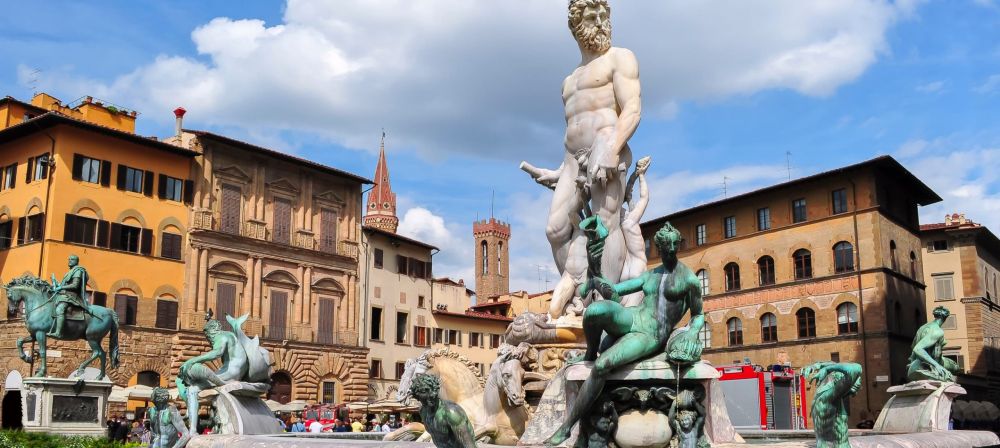

Piazza della Signoria has been a central hub of political and social life in Florence, Italy, since the 14th century. This L-shaped square is not only the focal point for the city's rich history but also hosts some of the most significant art and architecture in the world. The history of tourism in Piazza della Signoria is deeply intertwined with the history of Florence as a center of the Renaissance.
Florence began to attract tourists during the Renaissance period when it was famed for its art, culture, and political influence. The Uffizi Gallery, which flanks one side of the square, was originally built to house the offices of the Florentine magistrates but eventually became one of the first modern museums when it opened to the public in 1591. Art enthusiasts and scholars from across Europe visited the Piazza della Signoria to immerse themselves in the works of Michelangelo, Leonardo da Vinci, and other greats.
Dominating the square is the imposing Palazzo Vecchio, the town hall of Florence, with its robust crenellated tower offering panoramic views of the city. The Palazzo Vecchio has been the political heart of Florence since the 14th century, and today it houses a museum that chronicles the city's history, a destination in its own right for tourists.
Adjacent to Palazzo Vecchio is the Loggia della Signoria, where an open-air sculpture gallery exhibits magnificent statues, including a replica of Michelangelo's David (the original of which was removed to the Accademia Gallery to preserve it from damage).
Piazza della Signoria has always been a magnet for those interested in the convergence of art, architecture, and history. The presence of major works of art within public spaces allows visitors to enjoy a museum-like experience outdoors. Tourism has historically flourished here as a result of the high concentration of accessible cultural assets.
In recent years, tourism trends in Piazza della Signoria have shifted towards experiences that blend history with modern-day culture. Guided tours that encompass virtual reality elements, often retelling historical events or life in the Renaissance era, have become particularly popular. Culinary tourism has also seen a rise, with an increased interest in traditional Florentine cuisine, wineries, and cooking classes.
Seasonal events and exhibitions frequently take place in Piazza della Signoria, drawing both recurring visitors and new tourists interested in experiencing the square in different contexts—from modern art installations to historical reenactments.
The square's popularity comes with the challenge of overtourism, leading to efforts to promote sustainable tourism practices. Measures such as limiting visitor numbers to certain attractions and encouraging visits during off-peak months help to preserve the square's integrity. The City of Florence is continually seeking a balance between welcoming tourists and protecting its priceless heritage.
The Piazza della Signoria remains a testament to Florence's enduring legacy as a cradle of the Renaissance and a beacon for art lovers and history buffs alike. As it evolves to meet the needs of the modern traveler, it continues to be a quintessential stop for any visitor to Florence, offering a window into the past with the comfort and engagement of the present.